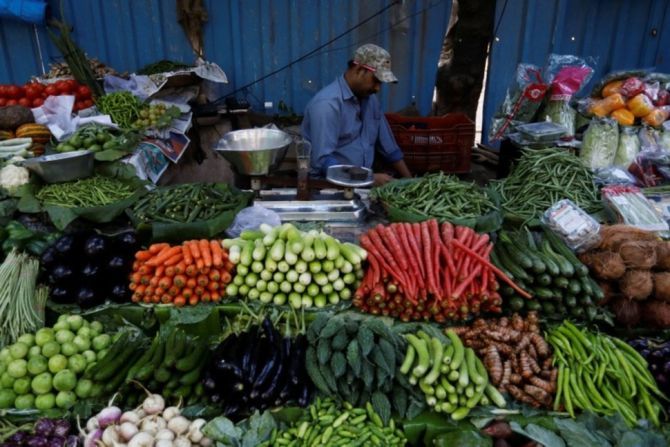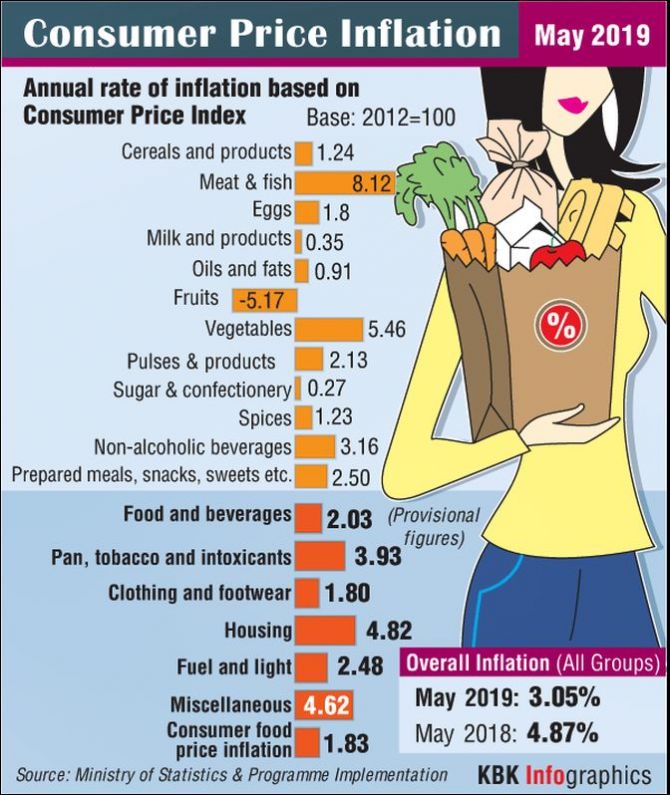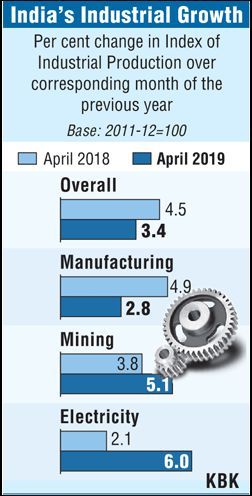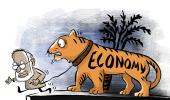According to the Central Statistics Office data, the jump in the retail inflation based on Consumer Price Index was mainly due to rise in prices of kitchen items like vegetables, meat and fish.

Retail inflation spiked to a seven-month high of 3.05 per cent in May, though still within RBI's comfort level, providing room for further interest rate cut to boost industrial output which expanded by 3.4 per cent in first month of the current fiscal.
According to the Central Statistics Office (CSO) data, the jump in the retail inflation based on Consumer Price Index (CPI) was mainly due to rise in prices of kitchen items like vegetables, meat and fish.
The latest inflation imprint is higher than the revised 2.99 per cent in the preceding month, but below 4.87 per cent recorded in May 2018.

The previous high was in October 2018, when the retail inflation print came in at 3.38 per cent.
Inflation for the overall food basket increased to 1.83 per cent in May as against 1.10 per cent a month earlier, the data showed.
The CSO's data on Index of Industrial Production (IIP) showed that while growth in April was subdued, it was still at a six-month high on account of improvement in mining and power generation segments.
 The IIP had expanded by 4.5 per cent in April 2018. The previous high in IIP growth was recorded at 8.4 per cent in October 2018.
The IIP had expanded by 4.5 per cent in April 2018. The previous high in IIP growth was recorded at 8.4 per cent in October 2018.
The expansion in the mining sector was 5.1 per cent compared to 3.8 per cent in the year-ago month.
Similarly, the growth in the power sector was 6 per cent in April as against 2.1 per cent in the corresponding month of the last fiscal.
However, there was a slowdown in the manufacturing sector.
Manufacturing growth slipped to 2.8 per cent in April from 4.9 per cent in the corresponding period last year.
Giving further details, the CSO data revealed that the growth in capital goods segment, the barometer of investment activities, slowed sharply to 2.5 per cent from a high of 9.8 per cent in April 2018.
Similarly, slower growth was recorded in infrastructure/construction goods, consumer durables and consumer non-durables segments in April 2019 on annual basis.
However, the production of primary goods increased by 5.2 per cent in April this year as against 2.7 per cent earlier.
The RBI, which has reduced the key lending rate (repo) three times in a row, primarily takes into account the retail inflation data while deciding its monetary policy stance.
The government has tasked the central bank to keep inflation at 4 per cent (plus or minus 2 per cent).
While reducing the interest earlier this month, the RBI had said its future monetary policy stance will be more accommodative, indicating the possibility of more rate cuts.
Earlier on Wednesday, the Economic Advisory Council to the Prime Minister (EAC-PM) had rejected Arvind Subramanian's claims of overestimation of GDP, saying a point-to-point rebuttal will be issued in due course and that the former CEA by his own admission is "still unsure" about calculation of growth numbers.
In a research paper, Subramanian, who stepped down last year, has said India's economic growth rate has been overestimated by around 2.5 percentage points between 2011-12 and 2016-17 due to a change in methodology for calculating GDP.
Photograph: Danish Siddiqui/Reuters











 © 2025
© 2025